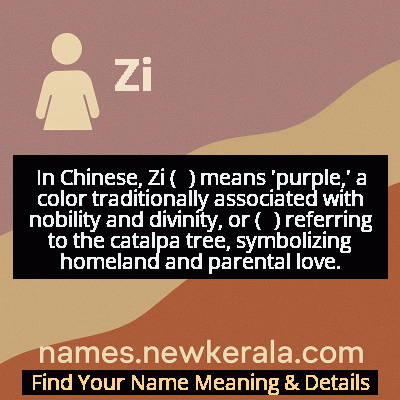Zi Name Meaning & Details
Origin, Popularity, Numerology Analysis & Name Meaning of Zi
Discover the origin, meaning, and cultural significance of the name ZI. Delve into its historical roots and explore the lasting impact it has had on communities and traditions.
Name
Zi
Gender
Female
Origin
Chinese
Lucky Number
8
Meaning of the Name - Zi
In Chinese, Zi (紫) means 'purple,' a color traditionally associated with nobility and divinity, or (梓) referring to the catalpa tree, symbolizing homeland and parental love.
Zi - Complete Numerology Analysis
Your Numerology Number
Based on Pythagorean Numerology System
Ruling Planet
Saturn
Positive Nature
Ambitious, efficient, realistic, and authoritative.
Negative Traits
Materialistic, stressed, confrontational, and can be overly ambitious.
Lucky Colours
Dark blue, black.
Lucky Days
Saturday.
Lucky Stones
Blue sapphire, amethyst.
Harmony Numbers
2, 4, 6.
Best Suited Professions
Business leaders, managers, financial services, law enforcement.
What People Like About You
Leadership, determination, organizational skills.
Famous People Named Zi
Zhang Ziyi
Actress
International film star known for martial arts films and dramatic roles, representing Chinese cinema globally
Zi Wen
Scholar
Pioneering researcher in Chinese literary studies and advocate for women's education
Li Zi
Fashion Designer
Revolutionized modern Chinese fashion by blending traditional elements with contemporary design
Wang Zi
Environmental Activist
Transformed environmental conservation efforts in rural China through community-based initiatives
Name Variations & International Equivalents
Click on blue names to explore their detailed meanings. Gray names with will be available soon.
Cultural & Historical Significance
Extended Personality Analysis
Women named Zi are typically characterized by a remarkable blend of outward grace and inner strength that manifests in multiple dimensions of their personality. They often exhibit exceptional emotional intelligence, allowing them to navigate complex social situations with apparent ease and diplomacy. This emotional awareness combines with a strong aesthetic sense, making them naturally drawn to creative pursuits, harmonious environments, and beautiful expressions in all forms. Their calm exterior frequently conceals a determined spirit and sharp intellect—they observe carefully before acting, making them strategic thinkers and effective problem-solvers. In relationships, Zi-named individuals are often the stabilizing force, offering wisdom and compassion while maintaining healthy boundaries. They tend to excel in careers requiring both creativity and analytical thinking, such as design, education, psychology, or leadership roles where their balanced approach inspires confidence. Their personality embodies the Chinese ideal of 'gang rou bing ji' (combining strength and softness), making them adaptable yet principled, gentle yet formidable when circumstances require firmness.
Modern Usage & Popularity
In the 21st century, the name Zi continues to thrive as a sophisticated choice that balances traditional roots with contemporary appeal. Its usage has expanded beyond China's borders through globalization, becoming increasingly popular among Chinese diaspora communities and even attracting non-Chinese parents drawn to its elegant simplicity and positive meaning. Digital globalization has further boosted its recognition, with social media platforms and streaming services introducing the name to international audiences through Chinese entertainment exports. Current naming trends show Zi being combined with both traditional Chinese characters and modern international names, reflecting the bicultural identity many families now embrace. While it remains most popular in urban centers like Shanghai, Beijing, and Shenzhen, its usage has become more democratized across different regions and social classes. The name's SEO-friendly brevity and positive connotations make it well-suited for the digital age, while its cultural depth ensures it never feels trendy or superficial. Recent data from Chinese naming registries indicates steady growth, particularly among millennial parents who value both cultural heritage and global citizenship for their children.
Symbolic & Spiritual Meanings
The name Zi operates on multiple symbolic levels that enrich its significance beyond the literal translation. In Chinese cosmological symbolism, it represents the harmonious balance between yin and yang—the graceful flexibility of water combined with the enduring strength of jade. When written with the character 紫 (purple), it connects to celestial symbolism, as purple was historically associated with the North Star and imperial authority, suggesting divine favor and noble destiny. The name also carries botanical symbolism, evoking the elegant bamboo that bends without breaking and the graceful orchid that blooms with subtle beauty. In psychological terms, Zi symbolizes the integration of apparent opposites: strength and gentleness, tradition and innovation, individual expression and social harmony. For modern parents, the name often represents their hopes for their daughter to navigate the complexities of contemporary life with both cultural rootedness and global awareness. It embodies the ideal of 'carrying ancient wisdom into modern times'—a symbolic bridge between generations that honors the past while embracing the future with confidence and grace.

